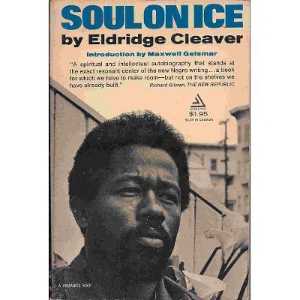Soul On Ice
|
First edition cover | |
| Author | Eldridge Cleaver |
|---|---|
| Country | United States |
| Language | English |
| Genre | Memoir |
| Publisher | Ramparts Press Inc. |
Publication date | 1968 |
| Media type | Print (Paperback) |
| Pages | 214 pp |
| ISBN | 0-440-18163-1 |
Soul On Ice is a memoir and collection of essays by Eldridge Cleaver. Originally written in Folsom State Prison in 1965, and published three years later in 1968, it is Cleaver's best known writing and remains a seminal work in African-American literature.[1][2] The treatises were first printed in the nationally-circulated monthly Ramparts and became widely read (even praised by Norman Mailer) for their illustration and commentary on "Black America." Throughout his narrative, Cleaver describes not only his transformation from a marijuana dealer and "insurrectionary" rapist into a convinced Malcolm X adherent and Marxist revolutionary, but also his analogous relationship to the politics of America.
Background
Eldridge Cleaver was born in Wabbaseka, Arkansas, in 1935,[3] amidst the severe and unrepentant racism of the South. In 1946, his family moved to Watts, California, where, although the racial climate was not as acute, the young Cleaver began delving into petty crime. After a series of arrests throughout his adolescence, in 1954, he was sent to Soledad State Prison for possession of marijuana. Though he was released within two years, later in 1957, he was convicted of sexual assault with intent to murder and was subsequently sent to San Quentin and then onto Folsom.
While imprisoned at Soledad, Cleaver obtained his high school diploma and read the opuses of Thomas Paine, Richard Wright, Lenin, Machiavelli, Karl Marx, Voltaire, Malcolm X, and W. E. B. Du Bois.[4][5] When he arrived at Folsom, he began to regularly write freely upon the subject of his "social" and physical imprisonment and the events of the era; 8 years later his lawyer, Beverly Axelrod, took the compositions to Ramparts and they were immediately published. After his release in December 1966, Cleaver was reporting for the magazine in San Francisco, and in 1968 Soul On Ice was released.
Content
"[W]hen I considered myself smooth enough, I crossed the tracks and sought out white prey. I did this consciously, deliberately, willfully, methodically -- though looking back I see that I was in a frantic, wild and completely abandoned frame of mind. Rape was an insurrectionary act. It delighted me that I was defying and trampling upon the white man's law, upon his system of values, and that I was defiling his women...I felt I was getting revenge. From the site of the act of rape, consternation spread outwardly in concentric circles. I wanted to send waves of consternation throughout the white race."
The essays in Soul on Ice are divided in four thematic sections:[7]
- "Letters from Prison", describing Cleaver's experiences with and thoughts on crime and prisons
- "Blood of the Beast", discussing race relations and promoting black liberation ideology
- "Prelude to Love - Three Letters", love letters written to Cleaver's attorney, Beverly Axelrod
- "White Woman, Black Man", on gender relations, black masculinity, and sexuality
The central premise surrounding the book as a whole is the trouble of "identification as a black soul which has been 'colonized'... by an oppressive white society that projects its brief, narrow vision of life as eternal truth."[8] Cleaver uses the informal essays to navigate through the history and present state of America, covering topics such as the murders of Malcolm X and Emmett Till; the race riots and Vietnam War; U.S. Foreign Policy and the American Flag; Muhammad Ali, Martin Luther King, Jr. and other "black celebrities;" Richard Wright's Native Son; Islam and Christianity; day-to-day prison life; and the relationship between black men and white women.[9] In the book, Cleaver admitted to raping black girls as a "practice run" before seeking white women as prey. The text also included homophobic attacks on the black novelist James Baldwin.
See also
References
- ↑ Taylor, Michael (May 2, 1998). "Ex-Black Panther Eldridge Cleaver Dies / `Soul on Ice' author, voice of black resistance was 62". San Francisco Chronicle. Retrieved May 11, 2010.
- ↑ Kifner, John (May 2, 1998). "Eldridge Cleaver, Black Panther Who Became G.O.P. Conservative, Is Dead at 62". The New York Times. Retrieved May 11, 2011.
- ↑ Bailey, Jeff. "Leroy Eldridge Cleaver". The Encyclopedia of Arkansas History & Culture. Retrieved May 11, 2011.
- ↑ Warren, Jenifer (May 2, 1998). "Former Black Panther Eldridge Cleaver Dies at 62". Los Angeles Times. Retrieved May 5, 2011.
- ↑ Cleaver, Eldridge (1999). Soul On Ice. New York, New York: Delta. p. 31. ISBN 0-385-33379-X.
- ↑ Eldridge Cleaver, Black Panther Who Became G.O.P. Conservative, Is Dead at 62New York Times, By JOHN KIFNER, May 2, 1998
- ↑ Andrews, William L., Frances Smith. Foster, and Trudier Harris. The Oxford Companion to African American Literature. New York: Oxford University Press, 1997.
- ↑ Cleaver, Eldridge (1999). Soul On Ice. New York, New York: Delta. p. 14. ISBN 0-385-33379-X.
- ↑ "'He was a symbol': Eldridge Cleaver dies at 62". CNN.
